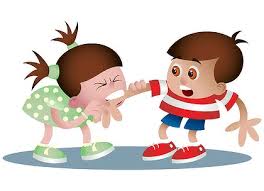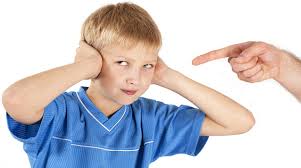Children who bite, hit and scratch often need to work on the following skills: language, self-awareness and emotional self-regulation. As a parent, you can help by giving your child more attention, reducing screen time and learning more about developmentally appropriate expectations.
Kids often fight and misbehave because they have a hard time communicating their thoughts. Over 50% of parents who reported worries regarding their child’s language skills also reported concerns about their child’s behavior (Long, 2008). Your child might hit someone because they do not know to say “please do not take my blocks from me”. They need years of modeling by an adult of what to say in various situations. They also may need more oral language practice in general. (See “Talk, Talk, Talk to Your Child.) For younger children, teaching them sign language results in a 50% drop in biting (Smith, 2015).
Your child may also need to grow in self-awareness of how he or she is feeling. You can help him accurately match his feelings with labels of those feelings like “frustrated”, “proud”, etc. Your child might say “I hate you” when he or she is just upset about not getting a cookie. (See articles “Teaching Self-Awareness about Emotions” and “Empathy”.)
All children need support in learning how to regulate their emotions. This can be done by modeling self-nurturance when you are upset or frustrated. (See “Self- Nurturing”). Another way is to role play scenarios that trigger strong feelings in your child. When your child is role playing, he can think more clearly how to problem solve and will remember your advice better. Role playing occurs at a different time from the incident and is absent of high emotions. It’s hard to role play in the heat of an argument because your child’s “fight, flight and freeze” chemicals inhibit higher order thinking.
Another way to reduce aggression is to spend lots of quality time with your child. Children act out when they don’t feel loved. (See article “Listening to Your Child”.)
Children may be fighting because that is what they are seeing on their media screens. (See article “Best Toys for Your Child”.) In addition, fighting can be caused by spending too much time on electronics; whether the content is violent or not, that screen time has dramatically reduced the time they spend learning how to interact with others.
Your child might be misbehaving because your expectations are too elevated or he needs support in meeting the expectation. (See the category “Developmentally Appropriate Environment and Approaches” and the article “Giving Your Child Just the Right Amount of Help”.)
Your child could be biting or hitting for a variety of reasons. Try the different solutions above to determine the underlying cause.
References
Long, C., Gurka, M., Blackman, J. (2008). Family Stress and Children’s Language and Behavior Problems. Topics in Early Childhood Special Education, 28(?), 148-156.
Smith, T. (Director) (2015, August 5). Child Growth and Development.Weekday Ministries Conference 2015. Lecture conducted from Presbyterian Weekday Ministries Conference, Houston.



